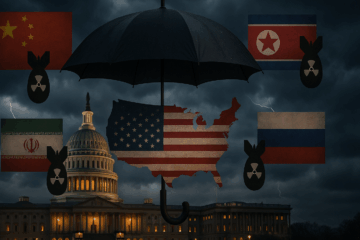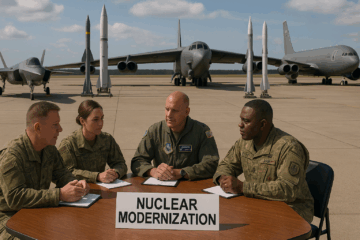Introduction
Two years have passed since the United States announced a unilateral ban on the testing of destructive anti-satellite (ASAT) weapons. The ban was announced on April 12, 2022, and hailed as a first step towards establishing a norms of responsible behavior to further the ideal of sustainability in outer space.
Several states, including many that do not possess nor intend to deploy such a capability, made similar proclamations. The People’s Republic of China, the Russian Federation, and India, however, refused to make the pledge. The US also sponsored a resolution, which was a lead-in to the Open-Ended Working Group on Reducing Space Threats, led by the United Kingdom and supported by the US. With the blinding effect of celebration subsiding, a more reasoned look at the drawbacks and weaknesses of the ban is in order.
Unilateral Arms Control Concession
Lost in the euphoria of the ban is the reality that the ban is a unilateral arms control concession. The US ignored an important tenet of diplomacy and negotiation and frittered away destructive ASAT testing without exacting similar concessions from Russia and China. American idealists believed that by signing the ban, the US would show leadership as a responsible actor and encourage both Russia and China to abandon their threatening counterspace build up. However, the American precedent of unilaterally banning direct-ASAT testing on its own without seeking concessions from either Russia or China signals to both that the US may be convinced to make more concessions without either adversary surrendering any of their own capabilities.
Sacrificing Freedom of Action
The unilateral American concession is not about giving up something vital to national security, but rather forfeiting freedom of action with no tangible benefit—other than creating positive political optics and an illusory norm of behavior. Many of the states pledged to the ban and the resolution lacks the requisite technology, capabilities, or the political desire to develop or acquire such technology. In other words, these states pledged to give up a freedom of action and a capability they neither possess nor plan to acquire. Conversely, Russia, China, and India, who all possess the capability, are not willing to give up their freedom of action to the advantage of the United States.
Demonstration Versus Test
The premise of the destructive test ban is the kinetic actions involving destructive ASATs are tests to determine whether a capability works. What the ban ignores is that these events are demonstrations and not tests.
The distinction between “test” and “demonstration” is not a matter of semantics but rather it is the difference between a state ascertaining whether it has a capability as opposed to showing others that it has a capability and a capacity. Ground-launched ASATs are an ancillary capability to missile defense technology, and the know-how for that capability has existed for decades.
Any state that possesses a missile defense capability is presumed to have a rudimentary ASAT capability that can transition to a break-out capability. Thus, a test ban is nonsensical as the need to test a capability is unneeded and any event involving an ASAT is considered a demonstration, including India’s 2019 satellite intercept and Russia’s 2021 intercept. Thus, the US has unilaterally sacrificed freedom of action for “destructive testing” when the capability is already proven and no longer necessary.
Implications for Missile Defense
An outright ASAT ban implicates the testing and development of mid-course missile defense systems. Direct-ascent ASATs are an ancillary capability to missile defense and destructive mid-course missile defense testing against dummy warheads could open the opportunity for Russia and China to complain that the United States is going back on its commitment and testing ASAT technology. This would fall in line with their narrative of “space weapons” given the impetus for this talking point is to stunt the development of American missile defense technology and capabilities. Nongovernmental organizations (NGOs) and academics focusing on sustainability would also foster this narrative and create public pressure for the US, both in and out of international organizations, to suspend missile defense testing.
Ceding Space Control
Space control is the unspoken chip on the table, especially since the US does not have an operational destructive counterspace capability and restricts its ability to develop offensive capabilities necessary to achieve deterrence through superiority with Russia and China. According to Dana Johnson, “Space control in geopolitical terms is the capability of a nation to maintain freedom of action in outer space and to deny the same to an adversary should national interests dictate.” The unilateral concession by the US bargains away kinetic space control for the ideal of sustainability and the anticipation it will create leverage and put international pressure on Russia and China to restrict their counterspace capabilities and thus ensure sustainability.
Conclusion
At its core, the unilateral ASAT test ban is a sacrifice of freedom of action made for political convenience and to check off a bucket list item for NGOs, academics, and civil servants. The US unilaterally forfeited something of major significance for something trivial and of questionable significance without taking into consideration it would not be reciprocated. The American attempt to use the ban to create momentum for its effort to create pseudo-norms and the drafting of a legally binding treaty to the same end is misplaced and is a detriment to American standing in outer space law, policy, national security, and deterrence.
Michael J. Listner is a licensed attorney in the State of New Hampshire and the founder and principal of Space Law and Policy Solutions. He is a subject matter expert and practitioner in outer space law, policy, security, and lawfare/hybrid warfare strategy. He is the author and editor of the space law and policy briefing-letter, The Précis. Views expressed are the author’s opinion and not legal advice.





Unfortunately, while Mr Listner’s comments appear to be well founded, he’s forgotten several things. First, the US has already demonstrated our ability to target satellites with a destructive test against a failed US satellite in 2008 — we do not need to do so again. Second, while the moratorium forgoes tests against orbital objects that create long lived debris, it still allows tests against non-orbital objects, as well as tests against orbital objects, as long as they do not create debris — both those approaches allow the thorough testing of sensors, engagement scenarios, dynamics, and other qualities that allow the US to develop a weapon and demonstrate capability without polluting the space environment. Third, the reality is that both China and India actually agree with the moratorium as demonstrated by the fact threat neither have conducted a debris causing test for over 17 years for China and 5 years for India. And with the UN vote of support by 155 nations, what the voluntary moratorium actually does is to further demonstrate Russia’s increasing pariah status with regard to space security.
The moratorium has now put the US back in the leadership position in space diplomacy, a position we had ceded for the last 40 years. It cost us nothing, further ostracized Russia, gained explicit or implicit agreement from almost every nation of the world, and made it that much harder for anyone else to engage in a debris-causing test. Pretty nice payoff for the price of a signature.
With respect to Mr. Loverro and his point of view I did not forget any of these talking points he brings up; word limits prevented addressing the narrative promulgated by the Biden Administration and NGOs, and I opted to use the opportunity to elucidate on my perspective. That said, I will briefly rebut Mr. Loverro’s points: First, the point is not whether the U.S. needs to destructively test ASAT capabilities. The reality is we made a unilateral arms control concession without extracting similar concessions from peer and near-pear geopolitical actors. Moreover, as noted in the article, the need for destructive testing is gone. The technology and techniques for doing so have been available to any state that possesses anti-ballistic technology, and thus as noted in the article an incident involving destructive actions are demonstrations of a capability not a test. Second, while the West dismisses the role of lawfare and hybrid warfare, the Russians, the PRC and certain NGOs are aware of its use. This means despite Mr. Loverro’s assurance testing of ballistic missile defense is protected, the role of lawfare and its use by the entities mentioned cannot be dismissed, especially since destructive testing involves technology ancillary to missile defense. Further, Mr. Loverro’s assertion the PRC, the Russian Federation and India implicitly agree with the ban is nonsensical for two reasons. 1) There is no evidence standing down further “testing” by these actors means they agree with the moratorium and 2) there is no reason for these actors to “test” a capability that they have demonstrated. Finally, the argument this unilateral concession puts the U.S. in a position of leadership is inaccurate. Indeed, the U.S. efforts at the Conference of Disarmament in 2018 calling out the Russian Federation and the PRC for their counterspace activities effectively burned down the soft-power efforts of those two actors in regard to outer space security and put the U.S. in a position of prestige. The unilateral concession made by the U.S. and its support of the Open-Ended Working Group, which was a diplomatic catastrophe, were a phoenix from the ashes moment for the PRC and the Russian Federation and their soft-power agenda. All-in-all, the ban is a political win and positive optics for those who support the ban but is also a soft-power win for the Russian Federation and the PRC.
Michael Listner makes many good points in this article. The US already suffered serious erosion of our security and prestige from the misguided attempt at a “pseudo-norm” of unilateral restraint and neglect re our nuclear deterrence modernization and necessary arsenal rightsizing. We are doing the same thing in space defense & deterrence, too. The world has enough of silly pyrrhic empty disarmament gestures such as the UN’s total ban on nuclear weapons. America needs to wake up to 21st century “nuclear realpolitik” just like we need to wake up to “space realpolitik.” Our adversaries run rings around us in lawfare shenanigans and in armaments expansion. Now with Putin’s “Sputnuke” and XI’s FOBS they are running rings around us in the intersection of nuclear capabilities and space capabilities!